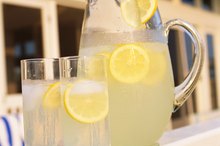What does fact checked mean?
At Healthfully, we strive to deliver objective content that is accurate and up-to-date. Our team periodically reviews articles in order to ensure content quality. The sources cited below consist of evidence from peer-reviewed journals, prominent medical organizations, academic associations, and government data.
- Centers for Disease Control and Prevention: Balancing Calories
- Harvard School of Public Health: Healthy Beverage Guidelines
The information contained on this site is for informational purposes only, and should not be used as a substitute for the advice of a professional health care provider. Please check with the appropriate physician regarding health questions and concerns. Although we strive to deliver accurate and up-to-date information, no guarantee to that effect is made.
Is Crystal Light Bad for You?
Staying well-hydrated is an important part of good health, but many people just don't enjoy the taste of plain water. Crystal Light is a good option if you're in this category because the water enhancer adds a burst of flavor to plain water. It is also low in calories, though there are a few nutritional drawbacks to consider before making it your beverage of choice.
Crystal Light Calories
Classic Crystal Light, which comes in a range of flavors, such as:
- lemonade
- fruit punch
- strawberry kiwi
- orange
- raspberry
- peach or lemon iced tea
- contains 5 calories per serving
Even two or three servings isn't going to cause your calorie balance to become out of whack. The Crystal Light mocktail flavors, which include margarita, appletini and mojito, each have 5 calories per serving. The Pure line of Crystal Light, which is made without artificial sweeteners and includes several flavors, such as
- strawberry kiwi
- grape
- mixed berry
- contains 15 calories per serving
Small Amount of Sodium
Review of Lifewater by SoBe
Learn More
Though sweet, all the Crystal Light flavors contain a small amount of sodium. One serving of the classic lemonade, for example, contains 35 milligrams of sodium. This isn't much at slightly more than 2 percent of the daily 1,500-milligram limit recommended by the American Heart Association to protect the health of your heart. Other flavors range from no sodium in the pink lemonade to 5 to 35 milligrams in the other flavors.
- Though sweet, all the Crystal Light flavors contain a small amount of sodium.
- One serving of the classic lemonade, for example, contains 35 milligrams of sodium.
Artificial Sweeteners
Artificial sweeteners used in foods and drinks are regulated by the U.S. Food and Drug Administration and are considered safe for human consumption. Cutting daily caloric intake by choosing artificial sweeteners over sugar can aid in weight loss by helping people cut their overall calorie and carbohydrate intake, according to the PubMed Health website. Some people might be concerned with putting artificial substances in their bodies, however, and the Pure line of Crystal Light doesn't use artificial sweeteners or preservatives.
Increased Fluids and Hydration
The Side Effects of Flavored Water With Aspartame
Learn More
If you have trouble drinking enough water, Crystal Light can help by making plain water taste more exciting. Plain water is the only beverage humans really need, according to the Harvard School of Public Health, and should be the drink you consume the most of 2. However, the school also notes that drinks made with non-nutritive sweeteners should be an occasional treat than a regular part of your diet. In the end though, it's more important to stay well-hydrated, and if you admit that you won't drink enough plain water, flavoring it with Crystal Light can be an alternative.
- If you have trouble drinking enough water, Crystal Light can help by making plain water taste more exciting.
- In the end though, it's more important to stay well-hydrated, and if you admit that you won't drink enough plain water, flavoring it with Crystal Light can be an alternative.
Related Articles
References
Writer Bio
Sara Ipatenco has taught writing, health and nutrition. She started writing in 2007 and has been published in Teaching Tolerance magazine. Ipatenco holds a bachelor's degree and a master's degree in education, both from the University of Denver.









